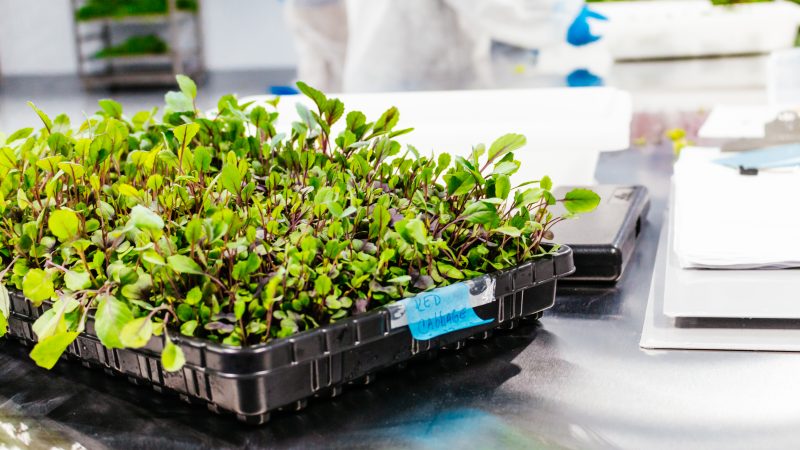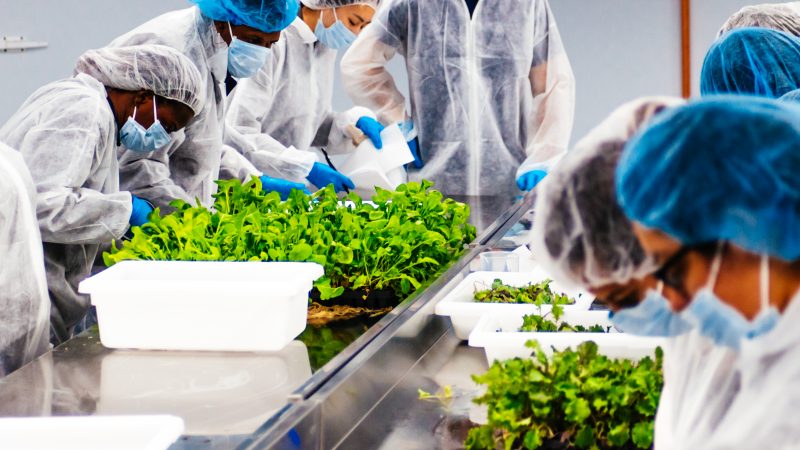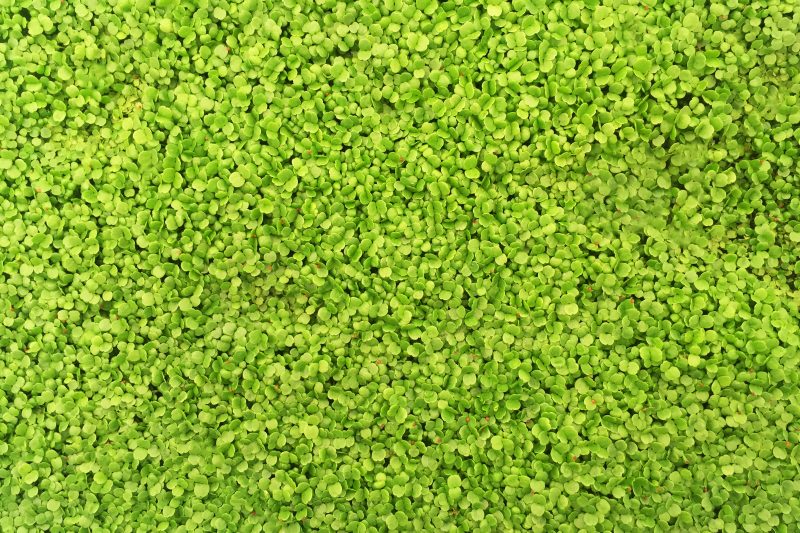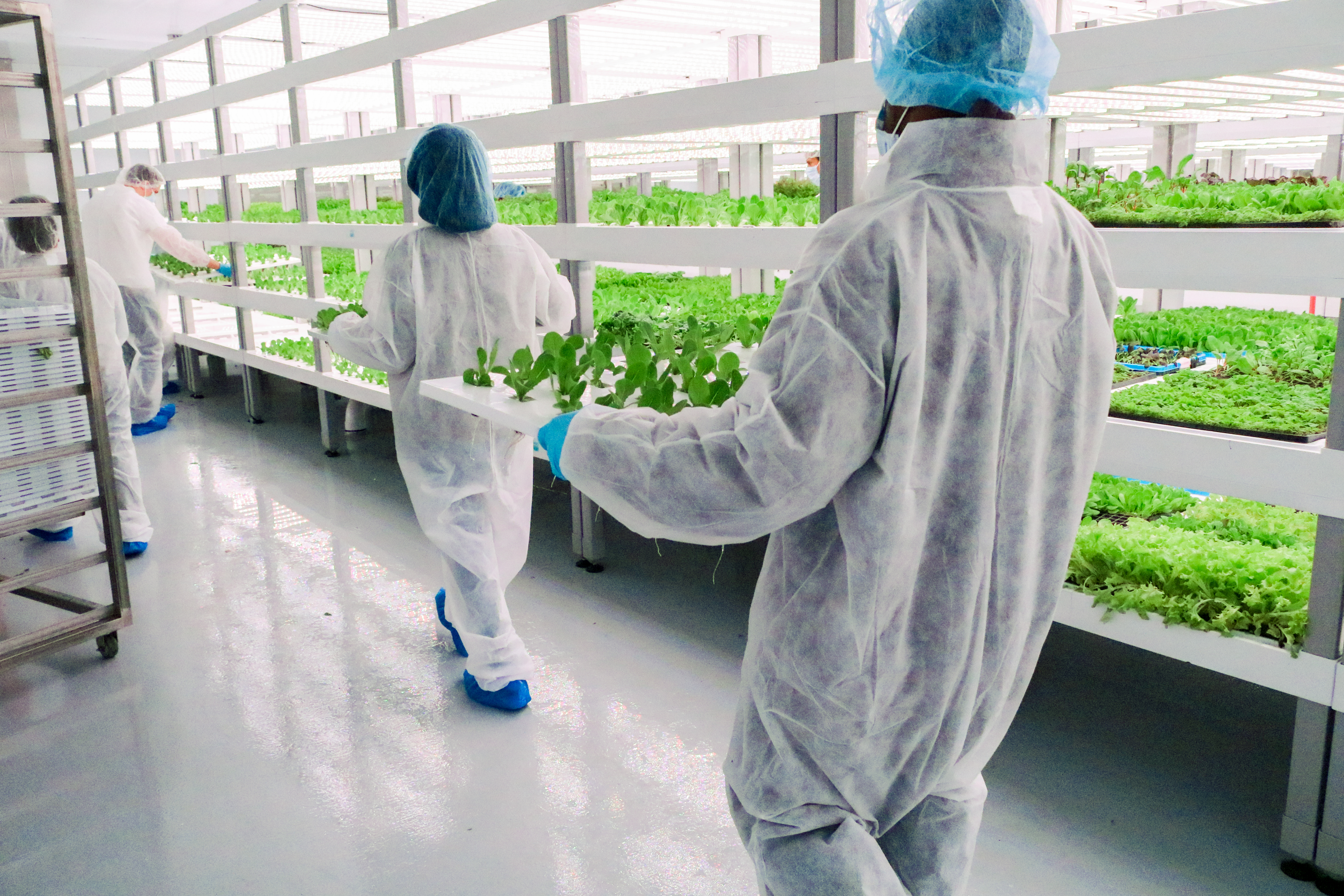Las Vegas isn’t the first place that springs to mind as a hub for sustainable agriculture. But the city could soon become a major purveyor of fresh greens, thanks to a new $30 million vertical-farming facility. At 215,000 square feet, it’s one of the largest indoor vertical farms in the US.
The facility is home to Oasis Biotech, a startup that transformed a vacant Las Vegas industrial property into a center for hydroponic farming, a process of growing plants without soil to conserve water and speed up the maturation process. The technique has become quite popular in recent years as farmers look for ways to deliver food year-round, within hours of harvesting their crops.
Though several vertical-farming companies have failed in recent years, Oasis Biotech is leveraging the resources of Las Vegas, a city known for its high-end cuisine and celebrity restaurants.
In July, the company hosted a grand opening featuring local chefs and mixologists who prepared salads and cocktails using in-house produce. Since then, Oasis crops have been sold to Vegas restaurants and casinos under the name Evercress. Prices are similar to what a customer might pay for an organic or specialty product, according to Oasis.
As its business continues to grow, Oasis Biotech could revolutionize the way Vegas - and other cities - approach agriculture. Take a look at its process below.
Oasis Biotech uses a controlled indoor environment and an LED lighting system to grow fresh produce 365 days a year.

The company's agricultural system recycles 100% of its water and nutrients. In turn, it saves about 90% more water than traditional field-grown crops. The LED lights also use 50% less energy compared with traditional indoor growing systems, Oasis says.
The company caters to the needs of the Las Vegas restaurant industry, producing crops like romaine and arugula alongside gourmet produce.

The company's current list of produce includes epicurean treats like chervil and mizuna, and it plans to eventually introduce "fruiting crops" like peppers, cucumbers, and berries.
While the produce isn't sold to the general public, it may soon be distributed to local grocers.
Growing the crops is a delicate process, requiring workers to wear a mask, gloves, and full bodysuit.

The Centers for Disease Control and Prevention estimates that 48 million people get sick from a foodborne illness each year. The process of indoor farming allows companies to have full control over their growing environment, reducing the chance of contamination.
Each seed is planted one at a time, using tweezers for maximum precision.

The germination room, where crops are grown, is kept at 85 degrees Fahrenheit and 85% humidity. The added warmth allows the seeds to grow faster.
After about 21 days, crops enter the harvest phase, where they are stored in an air-conditioned environment.
Once harvest is complete, crops arrive at their destination in one or two days.
The company has created more than 130 new jobs in southern Nevada.

While agriculture makes up about 1.7% of US employment, it accounts for only 0.15% in Clark County, Nevada. In time, Oasis Biotech hopes to jump-start the region's agricultural industry by creating more opportunities for workers.
Citing figures from the Nevada Governor's Office of Economic Development, the Las Vegas Review-Journal reported that the state's agriculture industry generates more than $500 million in annual revenue and more than $100 million in annual exports. Oasis Biotech could add tens of millions of dollars to the industry, according to estimates from its chief operating officer and general manager, Brock Leach.
The facility aims to produce more than 1 million pounds of produce each year.

In 2014, the Las Vegas Sustainability Atlas found that 92% of the city's food was shipped by truck, while just 8% was grown locally, according to the Review-Journal. Oasis' proprietary technology is designed to reduce the need to import crops, yielding more than 1,500 pounds of produce each day, it says.
"We want to redefine the meaning of fresh produce to Las Vegas," Leach said in a statement. "We are now living in a world where the produce your family consumes will be grown in the same city in which they live."

While most US produce travels between 1,500 and 2,500 miles before reaching the consumer, Oasis Biotech says it ensures crops are delivered within an average of 4 miles so they retain their flavor and nutrients.
When food is shipped long distances, it requires large amounts of fossil-fuel energy - about 10 times the amount of energy we receive from the food itself.

